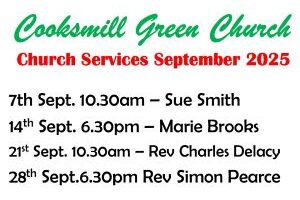Thought for the Month March 2023
Those of you who have got to know me will also know by now that, whilst I see benefits in the lectionary, our Christian festivals and seasonal periods, such as Advent and Lent (I adore Christmas and Easter), I also have concerns that we’re sometimes in danger of putting elements of our faith into neat little boxes to be taken out at the appropriate time.
Lent could be seen as one such season. The definitions of Lent cover things such as penance, fasting and self-denial, It’s a time when we reflect, among other things, on our own wrong doing and short comings, a time to re-evaluate our lives, a time to look ahead to the Passiontide. I’m not suggesting for one moment that we shouldn’t have Lent, in deed I think it’s a good idea. But this is not the only time in the year we should be thinking about these things. In fairness of course, if you are in a church that follows a liturgy, you will be reminded of many of these elements on a weekly basis (as we all should be). We’re also reminded of Easter every time we come to the Lord’s Table for Communion. Hopefully Lent helps us to re-focus that liturgy so that it doesn’t just become a parrot fashion chant!
While we reflect on a theological Lent as described, while we think of the terrible devastation occurring in the world, be it through war or natural disaster we shouldn’t forget the bible does not promise us a perfect world. In fact, quite the opposite it expressly warns us the opposite is true. We do not live in a perfect world.
One of this week’s lectionary readings is John 1 1-17 which reminds us that God and Jesus have been there from the very start of creation. At the end of Matthew’s gospel Jesus tells His disciples ‘remember, I am with you always, to the end of the age’ (Matthew 28:20) NRSV. Throughout time God has been and will be here and while he is here, in spite of what the world and its inhabitants might do, we read in Genesis ‘As long as the earth endures, seedtime and harvest, cold and heat, summer and winter, day and night, shall not cease.’ (Genesis 8:22) NRSV.
The 1st of March was the start of the Meteorological Spring. As cold as it at the moment, new life is already springing from the ground, some birds seem to be busy building nests (the pigeons in our garden are), blossoms will soon be in evidence. God’s promises are good.
Every day is an opportunity to repent and reflect. At the same time every day is an opportunity to rejoice in the seeds of God’s creation. In reality of course, these things are difficult to rejoice in when you are burdened by life’s many pressures, illness, stress, homelessness… the list is endless. So for those of us that can, it is up to us to plant the seeds of God’s love, plant seeds of kindness and compassion support those who seek to bring relief and comfort. so that all God’s people can experience their own Meteorological Spring, which can start on any day, not just the 1st of March. We don’t have to wait for any day, or season or lectionary period to reflect on and spread God’s word.
Steve.
Prayer
Dear God
As we rejoice in the New Life of Spring,
As we start to look forward to the
Hope of Easter and the Cross,
Help us to be instruments of hope,
To bring courage and expectation
And New Life in you to those in despair.
In Jesus Name. Amen











